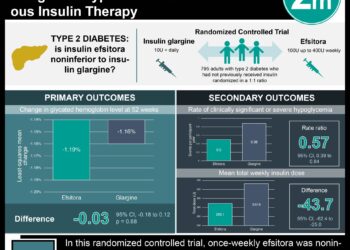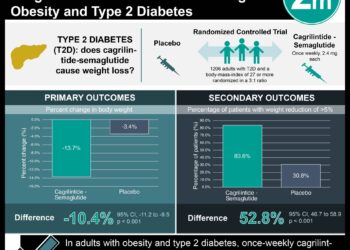Cortical volumes in African Americans with type 2 diabetes correlated with cognitive function
1. Type 2 diabetic (T2D) African American patients with gray matter (GM) atrophy on magnetic resonance imaging (MRI) scored lower on assessments of cognitive function, working memory, and executive function.
2. As compared to whole-brain GM loss, increased white matter (WM) lesion size was associated with poorer performance in cognitive assessments limited to working memory and executive function tasks, but overall white matter volume showed no significant associations with cognitive function.
Evidence Rating Level: 2 (Good)
Study Rundown: Diabetes has been associated with impaired cognitive functioning and an increased risk of dementia, particularly with poor control of blood glucose. Brain imaging studies in diabetic patients may help to clarify the pathogenesis and progression of these cognitive consequences. Despite the high prevalence of diabetes in African-Americans, the association between aspects of cognitive performance and structural changes in the brain due to macrovascular and microvascular effects of diabetes is not well-investigated in non-Caucasian populations. To this end, the present study examined the effects of cortical atrophy, GM and WM volume abnormalities on cognitive outcome in this understudied population. African-American patients with adequate access to healthcare and well-controlled T2D who were part of the targeted Diabetes Heart Study MIND were assessed on tasks made to assess various aspects of cognitive function. These results were then evaluated with regard to the extent of brain disease as assessed by both white and gray matter volumes, intracranial volume, and white matter lesion volume variations on MRI. Significant associations were found between reduced whole-brain GM volume and poorer cognitive performance in multiple domains including general function, working memory, and executive function while a smaller subset of cognitive abilities were affected in patients with whole-brain WM changes, including decreased function in aspects of working memory and executive function with larger white matter lesion volumes, although no significant links were found between overall WM volume and measures indicative of cognitive decline. While conclusions from this study helped to identify approaches to determine downstream cognitive outcomes of T2D and suggested possible intervention targets in an understudied population, future studies in this population would benefit from the inclusion of a non-diabetic control group.
Click to read the study in the American Journal of Neuroradiology
Relevant Reading: Type 2 diabetes and cognitive impairment: contributions from neuroimaging
In-Depth [retrospective cohort]: A total of 263 African American patients with T2D in the absence of diabetic ketoacidosis were included in the study, which was part of a greater research project focused on identifying risk factors for cognitive decline known as the African American–Diabetes Heart Study MIND. Subjects selected for the study were diagnosed after age 30 and on active treatment with either insulin or other oral hypoglycemic agents and were confirmed to have either ≥200 mg/dL nonfasting blood sugar, ≥126 mg/dL fasting blood sugar of, or an HbA1c of ≥6.5%. Neurologic 1.5T and 3T MR imaging was performed on these patients to assess brain structures affected by the macrovascular and microvascular effects of T2D, including whole-brain gray matter volume, white matter volume, and white matter lesion volume. These regions were assessed using multivariate modeling with patient performance on assigned cognitive tasks such as the mini-mental status exam (MMSE), the Stroop task, digital symbol coding task (DSC) and MoCA (Montreal cognitive assessment). The MMSE had a positive association with GM volume (p = 0.0023) but no statistically significant association with changes in white matter (WM volume p = 0.18; WM lesion volume p = 0.15). Patient performance on the Stroop task showed a negative association with GM volume (p = .035) and a positive association with WM lesion volume (p = 4.6 × 10−3), yet no significant association with WM volume (p = 0.26). DSC was positively associated GM volume (p = 0.015) and negatively associated association with WM lesion volume (p = 6.7 × 10−4), but no significant trend with WM volume (p = 0.12). On the MoCA, patients with GM volume loss scored less well on cognitive performance tasks overall (p = 0.022), while no significant association were found between MoCa and WM volume (p = 0.43) or WM lesion volume (p = 0.82). Interestingly, no associations were found between HbA1c, an indicator of glycemic control, with WM lesion volume (p = 0.51), GM volume (p = 0.36), or WM volume (p = 0.35).
Image: PD
©2015 2 Minute Medicine, Inc. All rights reserved. No works may be reproduced without expressed written consent from 2 Minute Medicine, Inc. Inquire about licensing here. No article should be construed as medical advice and is not intended as such by the authors or by 2 Minute Medicine, Inc.









